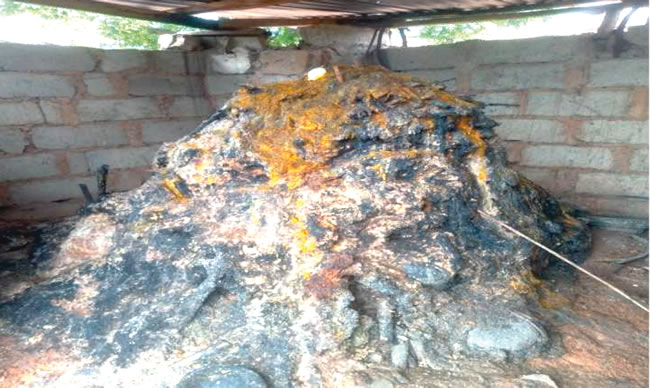Esu is believed to be a special deity from heaven. It will be brought by someone and situated at a particular point with the symbol of a laterite, (ogiyan), a process described as, ‘Won se Esu.’
Esu Awele is a shrine established by a woman who singularly brought to Ibadan the Esu that has been traditionally worshipped and well-known in Ibadan today; meaning that, (Awele ni o se esu ti won n pe ni Esu Awele).
Invariably, her name was used to identify the Esu shrine which she established over 250 years and worshipped before going for war expeditions as her source of political and spiritual power.
Though she was first the owner and started worshipping the Esu, the shrine later began serving Ibadan in general.
Great warriors of Ibadanland in the past, like Iba Oluyole (Awele’s husband), Bashorun Ogunmola, Ibikunle, Ajayi Ogbori-efon and others made Esu-Awele part of their source of power, strength and protection and went to the shrine to worship whenever it was a day or two for them to go to war.
(“Ibadan majamaja ni bi won ti keru komo …………………, Ibadan majamaja bii tojo kin in ni, Eyi to ja aladugbo gbogbo logun, Ibadan kii bani s’ore ai mu ni in lo s’ogun”)!
This is the pedigree of Ibadan land showcasing the people’s prowess in wars; what brought about the praises and pedigree for Ibadan was credited to Esu-Awele; it was said to be as a result of devoted worship of the deity.
At the demise of Awele and the devoted Ibadan warriors and great leaders and the time of colonisation and postcolonial era, leaders and people of Ibadan land continued the worship of Esu-Awele and were getting results of tranquility, political achievements, social harmony, personal progress, religious harmony, protection, etc, even to the state level, that is, at the creation of Oyo State (Ibadan being the capital of the state).
View of Esu Awele shrine
In the time past, as Ibadan warriors worshipped Esu-Awele to prepare for battle, attention was drawn to the shrine because people would accompany them there and follow them to the city gate at their departure.
This served as publicity for Esu-Awele shrine at that time, but in today’s world, due to civilisation, technological advancement and religious domination, Esu–Awele, one of the sources of unity in all spheres of life in Ibadan, is now being neglected and relegated.
People have forgotten about their root, especially descendants of Awele, particularly due to migration and religion.
Also, the government, because of civilisation and change in the way governance is being administered in Yorubaland, is not helping matters.
The relevance and potency of Esu-Awele for posterity should not be abandoned despite civilisation.
In the first instance, for fair justice and equity, the shrine can serve as guide to the judicial system in oath taking. Secondly, political officeholders can be brought to the shrine at the time of campaign, which will serve as awareness for politicians to be cautious and accountable to the people.
Thirdly, it will be a way for government not to neglect the traditional heritage since they can support spiritual and judicial administration in governance.
Fourthly, traditional rulers will no more be incapacitated in their functions of upholding the cultural identity of their local communities and domains; this will invariably give more recognition to them.
The fifth point is that, Esu Awele’s yearly festival, which was last celebrated around 2019, can be revived.
- Sanusi is Assistant Chief Planning Officer, National Commission for Museums and Monuments (NCMM) Nigeria.
READ ALSO: Bobrisky: Court orders Verydarkman to remove defamatory posts on Falana, Falz


